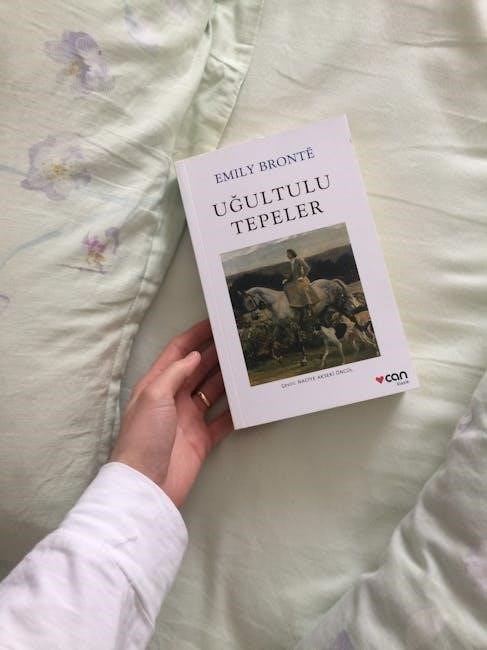Emily Henry’s Funny Story is a captivating romance novel that combines humor and heartfelt moments, following two jilted strangers who find solace—and more—together. A refreshing, honest tale.
Overview of the Book
Funny Story by Emily Henry is a romance novel that follows two jilted strangers who find unexpected solace—and more—in each other’s company. The book is praised for its refreshing honesty and realistic portrayal of relationships, blending humor with emotional depth. Known as Henry’s spiciest work, it features open-door sex scenes, particularly in Chapters 12, 19, and 28, adding a steamy edge to the narrative. Set against a cozy small-town backdrop, the story explores themes of love, friendship, and self-discovery. Readers have praised its engaging prose and relatable characters, making it a standout in the romance genre. The novel has gained a loyal fan base, with many appreciating its unique voice and heartfelt storytelling.

Why “Funny Story” Stands Out in Romance Novels
Emily Henry’s Funny Story distinguishes itself in the romance genre through its unique blend of humor, emotional depth, and steamy narratives. Unlike traditional romance novels, it offers an unfiltered look at relationships, making it refreshingly honest. The novel’s ability to balance lighthearted moments with profound introspection sets it apart. Henry’s writing style, which fans describe as realistic and engaging, further enhances the story’s appeal. The book’s success lies in its relatable characters and authentic dialogue, which resonate deeply with readers. By combining witty banter with heartfelt emotions, Funny Story creates a reading experience that feels both entertaining and genuinely human, earning it a special place among contemporary romance novels.

Plot Summary of “Funny Story”
Funny Story follows two jilted strangers who unexpectedly find solace—and romance—after crossing paths. Set in a cozy small town, the novel explores their journey from heartbreak to love, blending humor and heartfelt moments seamlessly.
Key Characters and Their Development
In Funny Story, Emily Henry crafts relatable protagonists navigating heartbreak and self-discovery. The two main characters, jilted strangers, evolve from wounded individuals to those embracing love’s unpredictability. Their witty banter and vulnerabilities create a deep emotional connection. Secondary characters, like quirky townspeople, add layers to the narrative, offering support and humor. Tinsley, a standout character, brings comedic relief with her outspoken nature and over-the-top reactions. Henry’s portrayal of flawed yet endearing characters allows readers to invest in their journeys, making their growth feel authentic and satisfying. The small-town setting further enriches character dynamics, fostering a sense of community and charm that complements the story’s romantic core.
Central Conflicts and Relationships
In Funny Story, the central conflicts revolve around misunderstandings, unresolved emotions, and the fear of vulnerability. The protagonists’ relationship is tested by their inability to communicate openly, leading to a series of awkward yet humorous situations. Their connection deepens as they confront their past heartbreaks and insecurities, revealing a shared need for trust and understanding. The tension between their growing attraction and their reluctance to embrace love drives the narrative forward. Secondary relationships, such as friendships and family ties, further complicate the emotional landscape, adding layers to the story. Henry expertly balances humor and heartache, creating a compelling exploration of love’s challenges and rewards.
Themes in “Funny Story”
Funny Story explores themes of love, friendship, and identity, blending humor with emotional depth to create a relatable and engaging narrative about life’s complexities and connections.
Exploration of Love and Friendship
In Funny Story, Emily Henry masterfully explores the intricate dynamics of love and friendship, weaving them into a narrative that feels both deeply personal and universally relatable. The novel delves into the ways friendships can serve as a foundation for love, while also highlighting the challenges of balancing these relationships. Henry’s characters navigate misunderstandings, unspoken feelings, and the fear of losing connection, all while learning to embrace vulnerability. The story emphasizes the importance of trust and communication, showcasing how true friendships can endure even the most turbulent moments. Through humor and heart, Henry illustrates the beauty of connections that shape our lives and help us grow.

The Role of Humor in the Narrative
Humor plays a pivotal role in Funny Story, serving as both a narrative device and a character-defining element. Emily Henry uses witty banter, situational absurdity, and relatable awkwardness to create a lighthearted yet emotionally resonant atmosphere. Through humor, the characters’ personalities and relationships are vividly portrayed, making their growth and interactions more engaging. The comedic moments not only provide relief from heavier themes but also highlight the authenticity of the characters’ experiences. Henry’s ability to weave humor seamlessly into the story enhances its appeal, making the narrative feel fresh and modern. Ultimately, the humor in Funny Story is not just entertaining; it deepens the reader’s connection to the characters and their journeys.

Genre and Style
Emily Henry’s Funny Story seamlessly blends romance and comedy, offering a fresh take on love. Her witty dialogue and relatable characters create a charming, modern narrative.
Blend of Romance and Comedy
Emily Henry’s Funny Story masterfully combines romance and comedy, creating a narrative that balances emotional depth with lighthearted humor. The novel’s witty dialogue and comedic moments enhance the romantic tension, making the story both heartfelt and entertaining. Henry’s ability to weave humor into pivotal scenes ensures that even the most serious conflicts are approached with a sense of levity, keeping readers engaged and invested. The blend of genres allows the book to appeal to a wide audience, offering a refreshing take on traditional romance. By integrating comedy seamlessly, Henry crafts a story that feels both authentic and joyful, setting it apart in the romance genre.
Emily Henry’s Unique Writing Style
Emily Henry’s unique writing style in Funny Story captivates readers with its sharp wit, relatable characters, and heartfelt storytelling. Her ability to craft dialogue that feels natural and authentic sets her apart, blending humor with emotional depth seamlessly. Henry’s prose is both evocative and concise, creating vivid scenes that draw readers into the narrative. Her characters are flawed yet endearing, making their journeys resonate deeply. The author’s voice is distinct, offering a fresh perspective on love, friendship, and growth. This blend of humor and poignancy, combined with her insightful exploration of human emotions, makes her writing style a standout in contemporary romance literature.

Reception and Reviews
Funny Story has garnered widespread acclaim for its witty dialogue and heartfelt storytelling. Readers praise its relatable characters and emotional depth, making it a beloved romance read.
Reader Feedback and Popularity
Readers have embraced Funny Story for its blend of humor and emotional depth. The novel has resonated with fans of romantic comedy, who praise its relatable characters and witty dialogue. Many appreciate how the story balances lighthearted moments with poignant reflections on love and relationships. On social media, readers often highlight the book’s ability to evoke both laughter and tears, making it a standout in the romance genre. The PDF version of Funny Story has also gained popularity, with many sharing quotes and scenes online. Its relatable themes and engaging prose have solidified its place as a favorite among contemporary romance readers, earning it a spot on bestseller lists and in book clubs worldwide.
Critical Acclaim and Comparisons to Other Works
Funny Story has garnered critical acclaim for its sharp wit and nuanced exploration of relationships. Reviewers praise Emily Henry’s ability to craft characters that feel authentic and relatable, while her dialogue sparkles with humor and intelligence. The novel is often compared to works by authors like Taylor Jenkins Reid and Sophie Kinsella, blending humor with heartfelt moments. Critics highlight how Henry’s writing elevates the romance genre, offering a fresh perspective on love and vulnerability. The PDF version of Funny Story has been particularly praised for its readability and engaging format. Fans of Henry’s earlier works, such as Beach Read and People We Meet on Vacation, have noted a consistent growth in her storytelling, solidifying her place as a leading voice in contemporary romance.

“Funny Story” as a Book Club Choice
Funny Story is an excellent book club pick, offering engaging themes, relatable characters, and humor that sparks meaningful conversations. Its PDF format ensures easy readability for all members.

Book Club Questions and Discussions
Funny Story by Emily Henry sparks lively discussions, making it perfect for book clubs. Questions like “How do the characters’ past experiences shape their relationships?” or “What role does humor play in the narrative?” encourage deep analysis. Members can explore themes of love, friendship, and identity, while debating the balance between heartwarming and heart-wrenching moments. The PDF format of the book ensures easy access, allowing everyone to highlight key quotes and scenes. Discussions might also touch on the author’s unique voice and how she blends romance with witty dialogue. Asking members to share their favorite comedic moments or how they relate to the characters’ struggles fosters connection and reflection. This book is sure to leave a lasting impression on any book club.
Food and Activity Ideas for Book Clubs
For a Funny Story book club, consider a thematic menu featuring light, humorous bites like “Plot Twist Cupcakes” or “Rom-Com Trail Mix.” Beverages could include “Love Potion Punch” or “Bookish Brew” coffee. Activities might include a trivia game based on the book’s quotes or a DIY craft station where members create themed bookmarks. An icebreaker could involve sharing favorite funny moments from the story. Discussions can be enhanced with a “-laugh-and-share” circle, where members recount their own humorous anecdotes. These ideas foster a lively, engaging atmosphere, making the book club experience as delightful as the novel itself. The PDF format of the book also allows easy access to quotes for games or decorations, ensuring a memorable gathering for all.
Emily Henry’s Approach to Romance
Realistic Portrayal of Relationships
Emily Henry crafts relatable characters, blending humor with emotional depth, creating authentic connections that resonate deeply, reflecting real-life complexities and vulnerabilities in romance.
Emily Henry’s “Funny Story” excels in its genuine depiction of relationships, offering characters that feel authentic and relatable. Her writing delves into the intricacies of human connections, exploring themes of communication, misunderstandings, and the gradual progression of bonds. By blending humor with poignant moments, Henry creates narratives that resonate with readers, making her stories both engaging and heartfelt. This approach not only enhances the emotional depth of her characters but also ensures that the relationships portrayed are realistic and impactful. Her ability to balance lightheartedness with sincerity makes her portrayal of relationships stand out, providing readers with a refreshing and genuine literary experience.
The Author’s Perspective on Love Stories
Emily Henry’s perspective on love stories is deeply rooted in her ability to blend humor with heartfelt insights. She believes that love is a complex, multifaceted experience that often intertwines with friendship, family, and personal growth. Henry’s approach to romance emphasizes the beauty of imperfection, showcasing how relationships are shaped by vulnerability, misunderstandings, and shared experiences. Her love stories are character-driven, focusing on the emotional journeys of individuals as they navigate their feelings. By avoiding clichés and embracing authenticity, Henry offers a fresh, modern take on romance that resonates with readers. Her perspective highlights the idea that love is both messy and beautiful, often found in the most unexpected places.
Emily Henry’s Funny Story captivates with its charm, wit, and heartfelt exploration of love, friendship, and personal growth. Blending humor with poignancy, it resonates deeply, leaving a lasting impression.

Final Thoughts on “Funny Story”
Funny Story is a delightful blend of humor, heartache, and hope, showcasing Emily Henry’s mastery of crafting relatable characters and poignant situations. The novel balances lighthearted moments with deeper explorations of love, friendship, and identity, making it a memorable read. Henry’s witty dialogue and nuanced storytelling ensure that the story resonates long after the final page. While it offers a fresh take on romance, it also feels familiar, like revisiting old friends. This duality makes Funny Story a standout in contemporary romance, leaving readers both entertained and introspective. It’s a testament to Henry’s skill that the book feels both effortlessly fun and profoundly moving.

Recommendations for Future Reads
If you enjoyed Funny Story, consider exploring other works by Emily Henry or similar authors. The Hating Game by Sally Thorne and The Rosie Project by Graeme Simsion offer witty, romantic tales with strong character dynamics. For fans of Henry’s style, People We Meet on Vacation by Emily Henry herself is a charming choice. The Friend Zone by Kristen Callihan and The Wedding Date by Jasmine Guillory also blend humor and heartfelt romance. These books capture the essence of contemporary romance with relatable characters and engaging plots, making them perfect for readers who appreciate humor, love, and self-discovery in their stories.

Leave a Reply